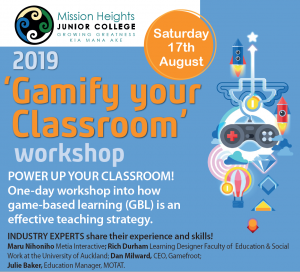Gamify your Classroom

POWER UP YOUR CLASSROOM! This one-day workshop delves into how game-based learning (GBL) is an effective teaching strategy. Hear from the ‘converted’ – teachers already creating meaningful learning experiences with GBL at the intermediate and secondary levels.
Industry experts will share research backing playful and game-based learning. Award-winning Māori game ‘Guardian’ is an adventure game about Māori settlement and heritage. SPARX is an interactive game based on cognitive behavioural therapy, designed to help young rangatahi manage their depression. Both games will be showcased, and participants will have an opportunity to engage with digital and non-digital resources to be used upon return to the classroom.
SPECIAL GUEST MARU NIHONIHO
‘Bringing Māori Culture To Video Games’. Two games bringing Māori culture and heritage to the forefront are Guardian and SPARX, influential award-winning games developed by NZ based company, Metia Interactive.
Maru will discuss her inspiration in developing the games, their global success, and how teachers can use them.
Teachers include:
- Ollie Baker, Stonefields School
- Tyne Crow, Pakauranga College (currently undertaking a Professional Teaching Fellowship at the University of Auckland)
- Diana-Grace Morris, RTLB Teacher (Cluster 29)
- Kate Lambert, Mission Heights Junior College
- Catherine Hunter, Mission Heights Junior College
Industry experts include:
- Maru Nihoniho, Managing Director, Metia Interactive
- Rich Durham, Learning Designer with the Faculty of Education and Social Work at the University of Auckland
- Dan Milward, CEO, Gamefroot
Book now for the Gamify your Classroom Workshop.
When: Saturday, 17 August, 8:00 am – 3:30 pm
Where: Mission Heights Junior College, 103 Jeffs Road, Mission Heights, Manukau, Auckland
Cost: $99/person, includes lunch and morning tea.
Workshop Sessions:
Maru Nihoniho – “Bringing Māori Culture To Video Games”
Two games that bring Māori culture and heritage to the forefront will be highlighted in this session. Guardian and SPARX, are powerful and award-winning games developed by NZ based company, Metia Interactive. Maru will discuss her inspiration in developing the games, their global success, and how they can be used by teachers.
Richard Durham – “Making Playful Learning”
For those who attended last year’s Games for Learning day, this is the second part of “game fit for purpose” workshop. Participants will establish a working vocabulary of playfulness/engagement to apply to your activities. Participants will work through modifying a formative assessment together to familiarise themselves with the planning instrument, and finally discuss with peers on how to apply them to their own activities.
Dan Milward – “Introducing Game Dev Clubs”
Gamefroot is levelling up digital technologies for your classroom this year by combining both code and culture in a new 90 minute game design workshop. Attendees will develop a game set in New Zealand and code some familiar characters including a young Kupe and the ghost of Captain Cook.
Attendees will leave the workshop prepared to take code into their classroom in a culturally inclusive and New Zealand kind of way. We will show you a way to integrate game design with local stories and inquiry in your classroom.
Catherine Hunter + MHJC Students – “Discussing eSports in Schools”
Participate in a roundtable discussion about how your school is running eSports and what barriers there may be. Year 10 students will share what information they have gathered and their thoughts on eSports in schools.
Diana-Grace Morris – “Getting Started with Game Design”
This session is back by popular demand! Are you keen to bring game play and game design into your classroom curriculum in a meaningful way, but unsure where to start? Are you wondering what kinds of learning you can build around a games focus? This session will take the form of an introductory workshop on making and playing games. I’ll show you how game-based learning can transform your classroom into a more creative, collaborative, and inclusive community, and bring out the best in your students. I’ll share insights from research and my own practice with Y 7 and 8 students, AUT pre-service teachers, and as an RTLB, including transforming the classroom into a game design studio space, making games for a national game design competition and PB4L, writing game reviews, and establishing school-wide Chess and code clubs. This session will leave you with lots of ideas you can put into practice on Monday.

